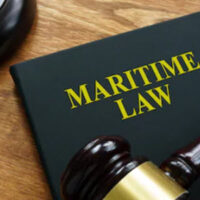Couple Sues Royal Caribbean After Deadly Volcano Explosion

A Virginia couple recently filed a lawsuit against Royal Caribbean after they say they suffered severe burn injuries in a volcano eruption that occurred in New Zealand. The volcano erupted on December 9, 2019 on White Island. Forty-seven people were visiting the island at the time of the eruption, and 21 of those people were killed. Plaintiffs Matthew Urey and Lauren Barham suffered severe burn injuries in the eruption.
Matthew and Lauren were on their honeymoon when the eruption occurred. Matthew sustained burn injuries over 54% of his body while Lauren sustained injuries over 23% of her body.
The question a jury will have to answer is whether or not the cruise line and the excursion company were negligent in exposing their passengers to that kind of danger.
“One of the Most Active Volcanoes in the World”
If you read the brochure for the excursion these passengers went on, it advertises White Island as having “one of the most active volcanoes in the world”. This can be taken in two ways. The cruise line and the excursion company obviously “knew” that the volcano potentially posed a danger to passengers, but the passengers, having read the brochure might also know.
However, a volcano is considered “active” if it erupts once every 10,000 years. This particular volcano had erupted multiple times in the past ten years. It was also experiencing increased volcanic activity that the couple was not aware of.
The question will be: did the cruise line/excursion company know or should they have known of an eminent eruption? Although volcanos can be active ( I have a great picture of my wife and I in front of the “active” volcano in Hawaii), few erupt without warning. Had there been increased seismic activity, increased atmospheric gas releases, or other signs the volcano was more than “active”. One thing the companies knew or should have known and disclosed was there was an earthquake only two weeks prior which indicated an increased in the risk of eruption.
Failure to Warn
While passengers can assume the risk injury and death and thereby waive any liability on the part of a cruise line or excursion operator, it is a well-established maritime and tort rule that these companies have a duty to warn customers and passengers of danger so that they can make an informed decision about going on the excursion.
In this case, the plaintiffs will argue that the excursion company and Royal Caribbean were in a superior position to assess the risk, they know of the increased seismic activity but failed to provide this information to passengers and/or failed to cancel the excursion, when they should have. Always more interested in revenue than safety.
At least 21 people died and many, like Matthew and Lauren, were severely injured all because the cruise line and the excursion operator more likely than not ignored the warning signs and instead of putting passenger safety first, were more concerned with passenger revenue.
Talk to a Miami Cruise Line Injury Lawyer
If you’ve been injured aboard a cruise ship, call the Miami admiralty & maritime lawyers at the office of Michael F. Guilford today to schedule a free case evaluation. We can help you recover damages related to your injuries.
Resource:
cnn.com/2020/06/26/us/couple-sues-cruise-line-after-volcano-eruption/index.html
https://www.crewcounsel.com/holland-america-sued-after-covid-19-outbreak/
